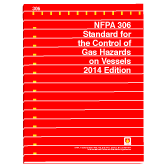
NFPA (Fire) 306
Product Details
- Published:
- 04/23/2023
- ISBN(s):
- 9781455930609
- ANSI:
- ANSI Approved
- Number of Pages:
- 36
- Note:
- This product is unavailable in Ukraine, Russia, Belarus


Click here to purchase
NFPA 306 spells out where combustible and flammable materials are present on marine vessels – and safety precautions for entry and work in confined spaces.
Gas hazards present considerable fire protection and life safety issues for marine vessels, shipyards, and waterfront facilities. NFPA 306, Standard for the Control of Gas Hazards on Vessels codifies a set of requirements to mitigate the dangers that may come with concentrations of combustible, flammable, or toxic liquids, gases, chemicals, or vapors.
NFPA 306 is essential for safety before and during work aboard.
The standard prescribes the minimum requirements necessary for entry and work in confined spaces on marine vessels and waterfront facilities. It applies to vessels during construction, alteration, repair, and shipbreaking, as well as land-side confined spaces (whether stationary or mobile) located within the boundaries of the shipyard or vessel repair or other waterfront facility. NFPA 306 requirements also help you determine when a marine chemist is required, how a marine certificate is issued and maintained, and what to expect during an inspection.
Activities that fall within the purview of this standard include:
Revised to closely align with U.S. Coast Guard and OSHA regulations, the 2019 edition presents technical changes such as:
Follow the most comprehensive provisions on gas hazards present on marine vessels and contained within shipyards.
Stay up to date with comprehensive provisions on gas hazards present on marine vessels and within shipyards and waterfront facilities. Order NFPA 306 to help protect your shipyard employees and contractors from injury. (Softbound, 36 pp., 2019)

Click here to purchase
Apply the 2009 NFPA 306 to reduce fire and explosion risks aboard marine vessels and in shipyards.
Essential to fire and life safety, NFPA 306: Standard for the Control of Gas Hazards on Vessels provides minimum requirements and conditions for use in determining that a space or area on a vessel, or in a shipyard or ship repair facility, is safe for entry or work. It specifies safety requirements for vessels carrying or burning as fuel flammable or combustible liquids, and also applies to vessels carrying or having carried flammable compressed gases, chemicals in bulk, or other products capable of creating a hazardous condition. NFPA 306 is the standard of practice that NFPA®-certificated Marine Chemists must follow in carrying out their duties where required by regulations of the U.S. Department of Labor/ OSHA and the U.S. Coast Guard.
The 2009 edition is based on new data and critical lessons learned:
Also includes revised requirements necessary for obtaining a Marine Chemist’s Certificate and the requirements for maintaining the Certificate. This edition of NFPA 306 is essential for everyone concerned with or responsible for marine fire and life safety or contracting aboard marine vessels or in shipyards.

Click here to purchase
Trust the 2014 NFPA 306 to provide guidance where combustible and flammable materials are present on marine vessels.
Gas hazards present considerable fire protection and life safety issues for marine vessels, shipyards, and land-side vessels. NFPA 306 codifies a set of requirements to mitigate the dangers that may come with concentrations of combustible, flammable, or toxic liquids, gases, chemicals, or vapors.
Newly organized with more intuitive workflows for shipyard employees and clarified preparation for inspections!
The 2014 edition of NFPA 306: Standard for the Control of Gas Hazards on Vessels has been completely reorganized to provide a more intuitive workflow for shipyard employees and vessel repair professionals. NFPA 306 makes it easier to determine when a marine chemist is required, how a marine certificate is issued and maintained, and what to expect during an inspection. It also clarifies how you can prepare the vessel for inspection and survey — and align work processes during vessel construction, conversion, repair, and other shipyard employment more closely with actual workflows.
Understand requirements for entry, work in confined spaces, or on vessels during various stages of construction, repair, and more…
NFPA 306 prescribes minimum requirements necessary for entry and work in confined spaces on marine vessels. The Standard applies to vessels during construction, alteration, repair, and shipbreaking, as well as land-side confined spaces (whether stationary or mobile) located within the boundaries of the shipyard or vessel repair facility.
A wide range of activities fall within the purview of this standard, including.
Stay up to date with the most comprehensive provisions on gas hazards present on marine vessels and contained within shipyards.